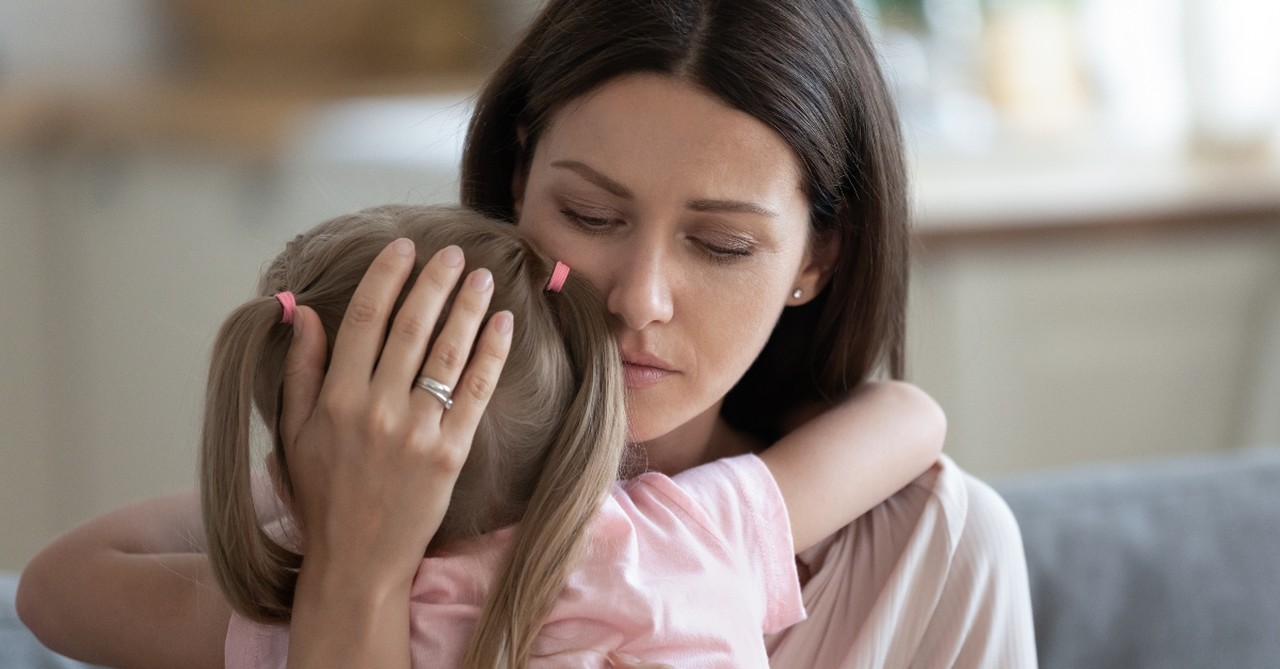How to Talk to Your Kids about Why Bad Things Happen to Good People

Since time immemorial, everyone from the faithful to the faithless has grappled with answering the question: Why would a good and all-powerful God let bad things happen to good people?
For purposes of this article, many a parent since time immemorial has grappled with finding an age-appropriate answer to this question when posed by their young child.
There’s no doubt that the question of why suffering exists in a world watched over by a loving God goes to the heart of your faith. However, you don’t have to dread the thought of what you’ll say when your child looks at you innocently and asks this difficult question.
You also don’t have to overcomplicate things with theological arguments that rise above your child’s head, or water things down with ambiguous answers that dilute away the truth of the matter.
Instead, you can stick to a gentle but Gospel-based approach that takes your child’s age into account.
Here are 4 ways to speak to your child about why God lets bad things happen to good people.
Photo Credit: ©GettyImages/fizkes
1. Bad things happen because not everyone chooses to obey God’s laws.

1. Bad things happen because not everyone chooses to obey God’s laws.
SLIDE 1 OF 4
“Therefore, just as sin entered the world through one man, and death through sin, and in this way death came to all people, because all sinned” (Romans 5:12).
At home, you give your kids the ability to make choices every day. You teach your kids what behavior is acceptable and what behavior isn’t. You also teach them that if they choose to disobey house rules, there will be consequences. This dedication to showing your children that their actions have consequences is borne out of your love for them and your hope that they’ll develop the judgment necessary to make good choices in the future.
In a similar way, you can explain to your children that our Heavenly Father loved us so much that He gave us the free will to make choices for ourselves. We can choose to live according to His ways and walk towards Him, or according to our ways and walk towards consequences.
One vivid way to explain this concept is through the story of Adam and Eve. When God created the world and gave Adam and Eve authority over it, there was no sin. God provided everything our first parents needed and gave them one simple command: they could eat the fruit of any tree in the Garden of Eden except for one.
God gave Adam and Eve the choice to obey Him. When they chose to disobey by doing what they wanted instead of what God commanded, they broke their perfect communion with God and brought sin, suffering, and death into the world (Genesis 3:19; Romans 5:12). Ever since then, there have been people who have chosen to continue disobeying God, and this disobedience triggers consequences. These consequences take the form of sin and suffering for the sinner as well as for those affected by his sin.
Related Resource: Listen to Our FREE New Parenting Podcast! Christian Parent/Crazy World with Catherine Segars is now available on LifeAudio.com. You Can Listen to the First Episode Now:
Photo Credit: ©GettyImages/imtmphoto
2. Even though people do bad things, God promises to bring good out of every bad situation.

2. Even though people do bad things, God promises to bring good out of every bad situation.
SLIDE 2 OF 4
“And we know that in all things God works for the good of those who love Him” (Romans 8:28).
We can’t understand all of God’s ways. We’re each limited by our own understanding and the inability to know what the future holds. The Lord Himself told us as much when He declared that His ways and thoughts are higher than our ways and thoughts (Isaiah 55:8-9).
Because of this, there will be many times when we won’t be able to imagine what good can possibly come from a terrible event. It’s especially hard for children to see how any good can come from hurtful situations.
When your child is affected by a hardship, you can comfort him with the knowledge that God promises to make everything work together to bring about a good result for those who love and trust Him (Romans 8:28). Even when you and your child don’t immediately see what good came out of the bad event, rest in knowing that God is faithful and always keeps His promises (Psalm 145:13).
If it’s an older child whose faith is being tested in tough times, it’s wise to remind them that Scripture tells us to “sow in tears” so that we may “reap in joy” (Psalm 126:5). The importance of sowing seeds of faith in times of sorrow is that it encourages your child to rely on God in the midst of hardship so that, at God’s appointed time, your child will reap a harvest for his steadfast faith (Galatians 6:9).
Photo Credit: ©GettyImages/Sam Edwards
3. The world is full of troubles, but Jesus overcame the world.

3. The world is full of troubles, but Jesus overcame the world.
SLIDE 3 OF 4
“In this world you will have trouble. But take heart! I have overcome the world” (John 16:33).
Children need to know that even though God promises to bring good out of all things for the faithful, that doesn’t mean that the faithful are exempt from suffering and tragedy. Jesus Christ warned that we’d have tribulations in this life, but that there is a better life awaiting His followers in Paradise. We should not be surprised that troubles come, even though God cares for and protects us.
Aside from wondering why bad things happen generally, your child may also be wondering why a bad thing happened to her specifically. If so, take the time to reassure your child that God loves her. Explain to her that, even when she’s going through difficult times, God has plans to prosper her and give her hope and a future in His timeframe (Jeremiah 29:11).
In addition, the Bible urges us to abide in Jesus during trying times to maintain our inner peace and courage (1 John 2:28). You can encourage your children to pray and sing songs to Jesus during challenging times to help turn their thoughts toward Him and, in time, gain a stronger sense of peace and courage.
There are also Bible-based shows that spread Christ’s message of peace, love, and faith through animated series. Veggie Tales is a good option for younger kids, and the cartoon series Superbook is a good option for older children. Both series can be seen on the Christian entertainment streaming service, Pure Flix.
Photo Credit: ©Getty Images/fizkes
4. The world isn’t perfect because people aren’t perfect, but Heaven is.

4. The world isn’t perfect because people aren’t perfect, but Heaven is.
SLIDE 4 OF 4
“God’s dwelling place is now among the people, and he will dwell with them. He will wipe every tear from their eyes. There will be no more death or mourning or crying or pain, for the old order of things has passed away” (Revelation 21:3-4).
We live in a fallen world and each one of us falls short of the glory of God (Romans 3:23). Children need to know in gentle, age-appropriate ways that the world isn’t perfect and that sometimes life’s circumstances will be unfair. Children who are grieving the death of a loved one may especially see life as cruel and unjust.
If you’re struggling to encourage a grieving child, assure your child that those who followed Jesus and whose life on Earth has ended are now restored through a new life in Heaven. In this new life, Scripture tells us there is no more death or crying or pain (Revelation 21:4).
While the faithful deceased enjoy their eternal life in Paradise, encourage your child to look to God for comfort and strength. Starting in Genesis and continuing throughout the Bible, God promises to be with us (Genesis 28:15).
God’s healing presence took human form when He sent down Jesus to offer the faithful peace and a pathway to eternal life (John 3:16; John 14:27). Even after Jesus physically left the world, God remained with us by sending down the Holy Spirit. The Holy Spirit is a source of comfort that guides us toward truth (John 14:16-17).
God never promised that He’d keep bad things from happening to those who love Him, but that He’d bring good out of any bad situation that His followers have to endure. Children need to know first and foremost that God loves them. Then they need to know that, no matter the circumstances, God will make everything okay if they choose to put their love and faith in Him.
Related: Listen to Our FREE New Parenting Podcast! Christian Parent/Crazy World with Catherine Segars is now available on LifeAudio.com. You Can Listen to the First Episode Now:
Photo Credit: ©Unsplash/Eye-for-Ebony
Dolores Smyth is a nationally published faith and parenting writer. She draws inspiration for her writing from everyday life. Connect with her over Twitter @byDoloresSmyth.
Originally published April 23, 2021.









